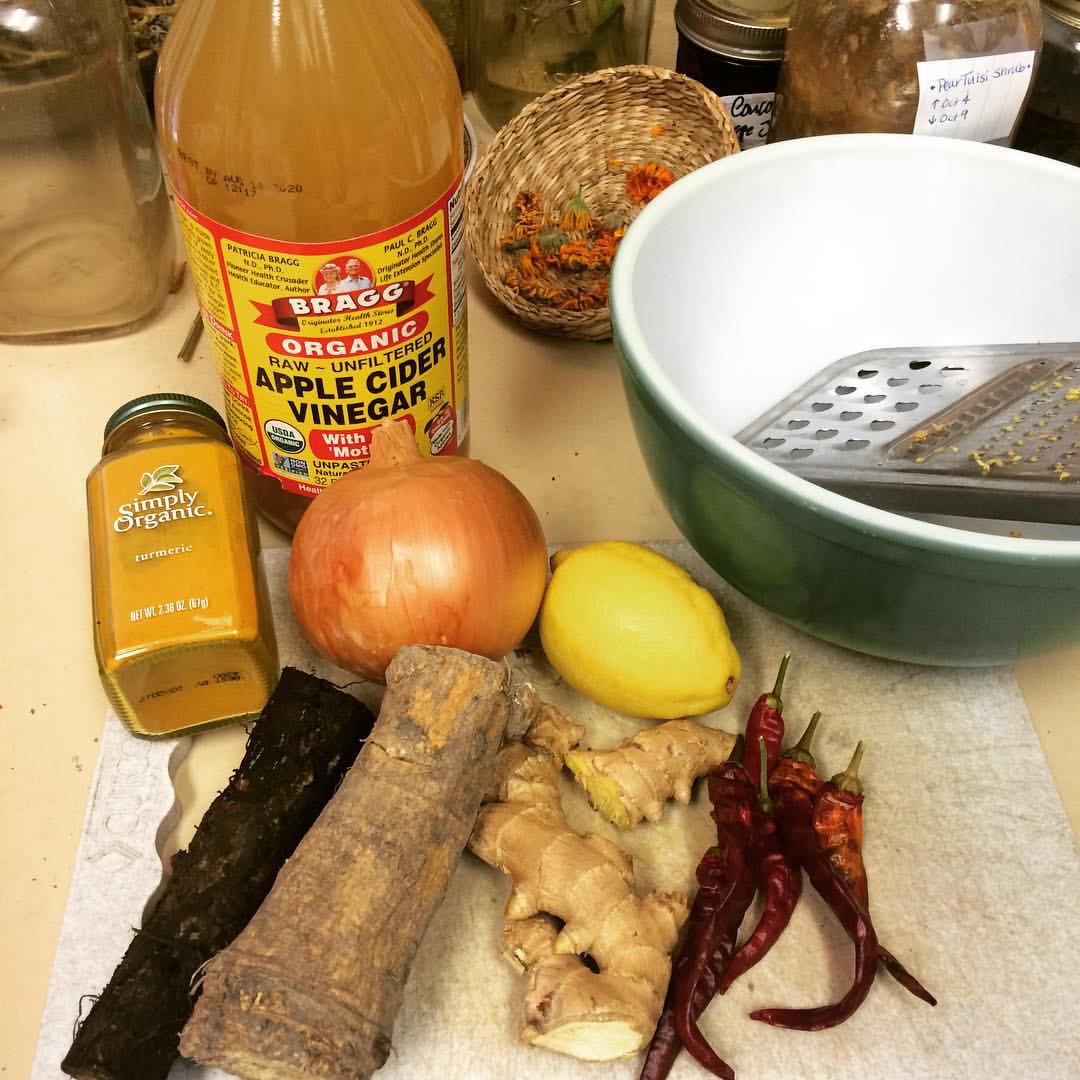Fire Cider: A Classic Brew for Colds and Flu

Fire cider is a traditional immune-supporting remedy with deep roots in folk medicine to help aid the upper respiratory system.
At its most basic description, it’s a spicy and powerful vinegar infusion, loaded with immune-supporting, anti-inflammatory, anti-bacterial, anti-viral, and circulatory herbs. It is used for all of these qualities as well as a decongestant and expectorant - grate up some horseradish, and you'll know what I mean!
The best part is, you can make it at home using store-bought ingredients, or take it to the next level and grow all of your own ingredients!
Here's a break down by system for an at-a-glance look at the uses for fire cider.
Immunity:
Nearly every ingredient is antibacterial, and garlic and ginger additionally are antiviral, making this mixture a natural antibiotic! Fire Cider increases your white blood cell count and stimulates immune response. Horseradish promotes perspiration, making it useful in fevers, colds, and flu. One of the active constituents in garlic and onion (allicin) is highly antimicrobial, antiviral, antioxidant, immune-enhancing, and anti-inflammatory, and they help enhance the action of vitamin C (Duke, 1997; Li, 2008).
Lungs, Congestion, Allergies:
It’s a respiratory aid, and, as an expectorant has an affinity for coughs, helping to break up congestion in the lungs to thin and expel secretions. In eastern medicine traditions ginger is used to break up congestion throughout the body, including in the lungs and nasal passages.
Perfect for a wet, boggy, deep cough. Because of its strong decongestant properties, it's also very helpful for sinusitis and allergies to relieve sinus congestion, sinus headaches, and copious secretions.
Circulation:
It's a circulatory stimulant, both internally and topically as a liniment for bruises, strains, and injuries. Particularly beneficial externally on these injuries due to its anti-inflammatory properties. Ginger is warming, and it stimulates circulation of the blood. Cayenne, due to high levels of capsaicin, increases circulation.
Fire Cider is also a cardiovascular tonic helpful for high cholesterol, prevent arteriosclerosis (thank you, garlic!), and for heart health in general.
Digestion:
Lastly, this can be used as a digestive cocktail, stimulating digestive enzymes and secretions. Horseradish strongly stimulates the digestive fire, increasing gastric secretions and appetite. This can help to ease gas and bloating, and support nutrient absorption and digestive health.
How Much Do You Take?:
As a tonic to help prevent cold and flu and act as an immune supporter, take about 1 tbsp up to 1 shot glass 1-2 x/day mixed in water or straight. It can also be added to foods like dressings, marinades, soups, or tossed on cooked greens. You can also add it as the vinegar portion when you’re making bone broth. If you are coming down with a cold or flu or already sick, you may want to start at the higher end of the spectrum.
I use homemade fire cider in a few ways — as a defense against colds and flus, at the first sign of cold symptoms, and as a decongestant and expectorant when the cold has set in.
You can customize the level of spice with the addition or omission of hot peppers, and to add sweetness, add a little local honey.
Uses:
Ingredients (Organic if possible):
1 Qt Organic Apple Cider Vinegar (raw if possible)
1/4 cup Fresh Horseradish root, grated
1/2 cup Fresh Turmeric root, grated
1/2 cup Fresh Onion, chopped
1 bulb Fresh Garlic (to taste, can do more!!), chopped
1/2 cup Fresh Ginger root, grated
1/2 cup Fresh Burdock Root, chopped
1/4 cup Thyme
1 Lemon, with peel
1-3 small Cayenne Pepper (or about 1 tsp)
2 tsp Ground Pepper
Raw Honey
Some other fun additions:
Rosemary springs, Oregano, or different Hot Peppers (Serrano, Jalapeno, etc)
Directions:
1.) Chop-up or grate all the ingredients and add to your jar. If using a mandolin, be carefu!
2.) Cover the plant material about 3/4ths of the way with the apple cider vinegar and then cover the remaining 1/4th of the plant material with raw honey. This is kitchen medicine - its ok if your amounts aren’t exact!
Don’t worry if your honey doesn’t dissolve right away - it will over time, even if its crystallized. Cover the top with wax or parchment paper (since the vinegar will corrode metal) and then put the outer ring over that.
3.) Let sit at least 2 weeks, shaking daily. It’s ok if you it goes longer -- you can even let it steep for a year -- but it will be ready in 2 weeks.
4.) Strain and store out of direct light. This has a very long shelf-life and does not need to be refrigerated.
WARNING!
Do not touch your eyes or any other mucous membrane after making this unless you wore gloves!
Contraindications:
Since this formula is so hot and spicy in nature precaution should be taken for those with chronic heartburn, acid reflux, gastric ulcers, IBS, Crohn's Disease, sensitive stomach. Stop taking 2 weeks before and after surgery because of bloodthinning effects.
References:
Duke, J. (1997). The green pharmacy. Emmaus, PA: Rodale Press.
Li, T. S. C. (2008). Vegetables and fruits: Nutritional and therapeutic values. Boca Raton, FL: CRC Press.
...

Kimberly Jean, BSN, MA
Herbalist and Educator, Perfect Supplements
Kimberly holds a Bachelor's of Science in Nursing and a Master's of Arts in Education Research and Administration. She currently sits on the Editorial Review Board for the Journal of the American Herbalists Guild. Kimberly has studied directly under Alexis Durham lead herbalist at Herb Pharm, Sajah Popham of Organic Unity spagyrics, Pearl Sites and Tyler Wauters of Hawthorn Institute, amongst many others. Kim, in recent years, started and directed several large scale commercial herbal apothecaries for community retailers on both the West and East coast, with close working knowledge of over 300+ botanicals.
As always, the information in this section is intended for educational purposes only and is not a substitute for the advice of a qualified healthcare professional. Herbs can have interactions with medications and other natural products. If you consider taking an herb, I encourage you to read up on it before you begin consuming it, its extract, or essential oil.In addition if you are pregnant or nursing, you have to be very careful as to which herbs you can safely take. As an herbalist, I am sharing this information as a starting point, if you do decide to take action, please consult with a qualified healthcare professional who is familiar with your unique and specific situation.











